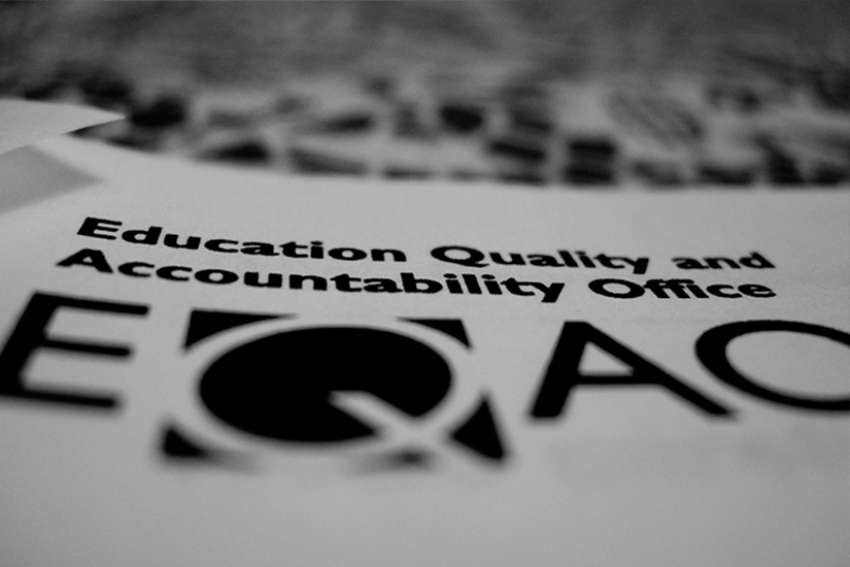The tests have been administered since 1996 and measure students’ progress in reading, writing and math. Their effectiveness has been debated ever since.
Photo by RyanMcGilchrist/Creative Commons (CC BY-SA 2.0)
EQAO student testing debate heating up again
By Meggie Hoegler, The Catholic Register
As Ontario thaws out from a deep freeze, schools and administration offices across the province are heating up a two-decade old debate.
Every spring, Catholic and public school students across Ontario in Grades 3, 6, 9 and 10 sharpen their pencils and sit down to write EQAO — a standardized test administered by Ontario’s Education Quality and Accountability Office.
The tests have been administered since 1996 and measure students’ progress in reading, writing and math. Their effectiveness has been debated ever since and is once again in the spotlight after a principal with the Simcoe Muskoka District Catholic School Board allegedly tampered with the Grade 10 literacy test.
In March 2016, Christine Vellinga allegedly called 21 students back to finish incomplete tests, breaking the rules of EQAO which state that all booklets are to be collected and unopened before being sent to the EQAO offices for grading. Vellinga, who allegedly told students “you were never here,” after they finished, is facing charges from the Ontario College of Teachers of professional misconduct for tampering with the test.
Students must pass the Grade 10 literacy test in order to receive their secondary school diploma. According to Dr. Linda Bream, a child psychologist in Guelph, Ont., that kind of pressure breeds a lot of anxiety.
“I see a lot of anxiety surrounding EQAO tests, not just from students but from parents and teachers, too,” said Bream. “It depends on how it is presented to all these people. If it is framed as a way to see how students are doing and if schools help students prepare, kids and parents will have a sense of what is coming and will be a lot less worried.”
But there are opportunities and accommodations available to students. Many schools offer EQAO prep and practice opportunities both in and outside of class time. Children with learning disabilities are given accommodations when writing the test so results are fair and accurate.
Despite this, some organizations believe the test is too much of a high-stakes game.
“These assessments only capture a moment in time,” said Liz Stuart, president of the Ontario English Catholic Teachers’ Association. “They fail to account for the range of skills and factors that affect achievement. Our organization has always been concerned about the high stress levels this kind of testing creates for parents, students and administrators.”
In September, Ontario Premier Kathleen Wynne announced a “curriculum refresh” for the 2018-2019 academic year, which includes an examination and update of EQAO. Wynne said the math portion of the test would be updated after less than half of Grade 6 students met provincial standards in 2017.
In addition to measuring student academic progress, EQAO holds schools and teachers accountable.
“Schools are ranked and it is a reflection of the Ontario curriculum,” said Bream.
“It creates anxiety. If a school doesn’t do well, teachers are left wondering if it’s something they are doing wrong. But it also creates accountability.”
Accountability can be compromised when the rules are broken. Which is why the Ontario College of Teachers has taken the allegations against Vellinga so seriously.
Vellinga was suspended for 20 days without pay and demoted to a vice-principal position at another school.
Gregory Quinn, a teacher, and Andrew Burke, a vice-principal, are facing similar charges for aiding Vellinga. She will appear at a disciplinary hearing on Jan. 26.
The Muskoka Catholic District School Board will not comment on the case until after the hearing.
Please support The Catholic Register
Unlike many media companies, The Catholic Register has never charged readers for access to the news and information on our website. We want to keep our award-winning journalism as widely available as possible. But we need your help.
For more than 125 years, The Register has been a trusted source of faith-based journalism. By making even a small donation you help ensure our future as an important voice in the Catholic Church. If you support the mission of Catholic journalism, please donate today. Thank you.
DONATE

